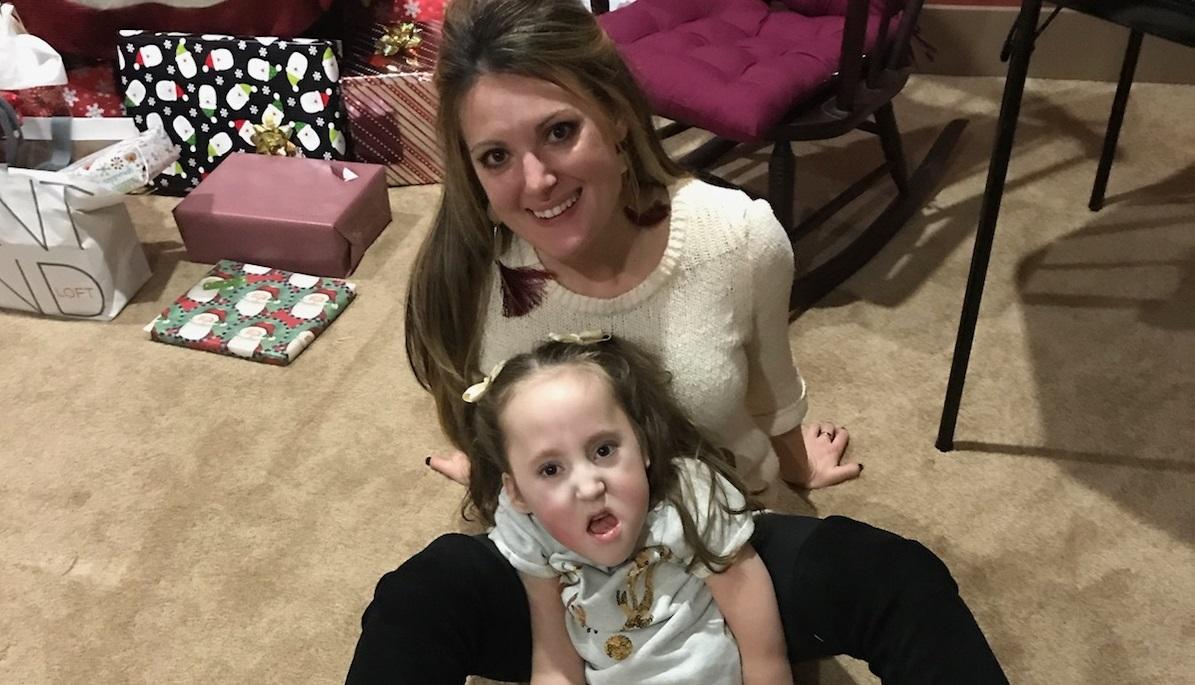“Any mom I meet, I encourage her to be selfish.”
 This statement comes from Marisa, an Aveanna mom whose daughter, Brylee, was born with nemaline myopathy. After Brylee’s birth, Marisa dedicated her entire life to her daughter’s care. For the first three years of Brylee’s life, Marisa was home with her every day, a full-time mom and caregiver. Now that Brylee is in school, Marisa is working again. But she still rushes home to be with Brylee and tuck her in each night.
This statement comes from Marisa, an Aveanna mom whose daughter, Brylee, was born with nemaline myopathy. After Brylee’s birth, Marisa dedicated her entire life to her daughter’s care. For the first three years of Brylee’s life, Marisa was home with her every day, a full-time mom and caregiver. Now that Brylee is in school, Marisa is working again. But she still rushes home to be with Brylee and tuck her in each night.
Why is Marisa telling parents to be selfish?
Because, as Marisa so aptly puts it, “You just have to do things that make you feel sane for a hot minute!” She knows that if you aren’t actively safeguarding your sanity, you are going to lose it. And, if you are the parent of a medically fragile child, you are going to suffer from caregiver burnout. Marisa describes the caregiver burnout she experienced during the three years she spent at home with Brylee: “You’re home alone, isolated…Your excitement is to go to a doctor’s appointment. You’re just like, ‘Get me out of this house! I’m tired of looking at the same walls, I’m tired of talking about the same stuff.’ And not all of it is exciting. It’s not like your child is ever changing and getting better and better…This is where it’s at and it gets harder.”
Parental caregivers have a higher risk of experiencing caregiver burnout. You might think the love you have for your child will shield you from caregiver burnout, but this emotional connection can actually contribute to caregiver burnout. Part of this is due to the unique stress that parents of medically fragile children deal with. Marisa explains, “You’re grieving all the time of what was going to be, what will be, what won’t be. It’s a different kind of motherly stress.” This grief speeds up caregiver burnout, which will jeopardize the care you provide for your child.
“You have to find mental stability. You have to be selfish with yourself to a certain degree. You’re needed by so many people.” Marisa knows that before you meet the needs of others you must learn to recognize and fulfill your own needs. For many parents of medically fragile children, this concept can be difficult to accept.
In order to accept the necessity of taking care of yourself, Marisa says, “Finding a good therapist to work out those feelings or to just talk them through and process them is imperative.” The key to effectively caring for your child is maintaining your own mental health. Don’t wait until you are spread too thin to look into therapy options. Therapy is useful to everyone and may be more accessible to you than you think. Many insurance plans cover psychotherapy costs. Consult your insurance provider to determine the exact mental health benefits that are available to you.
If therapy is not accessible or desirable to you, a good alternative to going to a professional therapist is joining a support group. Find other parents who have gone through things similar to what you are going through. You can learn from their experiences, gaining what Marisa likes to call a “road map” of what you and your family will go through. Knowing what’s ahead and how to deal with it before it comes helps reduce a lot of the stress that caregivers face.
There are many different ways to practice self-care and avoid caregiver burnout on a day-to-day basis. The regular activities that ease stress can vary from parent to parent. For example, Marisa likes to run and lift weights, but these activities might add even more stress to your life! Other common activities used to alleviate caregiver burnout include yoga, prayer or meditation, and working on solvable tasks at work or at home. Every caregiver is in a different situation, and no single answer to caregiver burnout will work for everyone. As Marisa notes, “I’m not saying that I’ve found the secret or I’ve found the perfect balance, but I’ve found a balance that has worked for me and that I believe in.” You just have to find what will work for you.
Caregiver burnout is a very real threat to both caregivers and patients. If you are a primary caregiver for a loved one, please reach out for help. Whether it is from a professional therapist or from a peer support group, every caregiver (whether they believe they are suffering from caregiver burnout or not) needs encouragement and support. Find accessible daily activities that make you feel refreshed and reenergized. Learn to take care of yourself. Regardless of who you work through your stress with, what self-care activities you engage in, or whatever else you do, remember Marisa’s most important piece of advice: Be selfish.